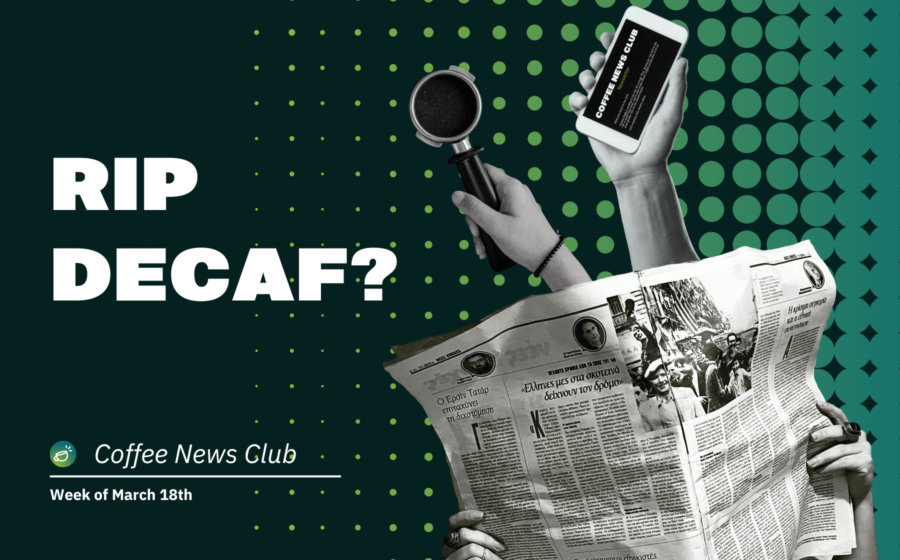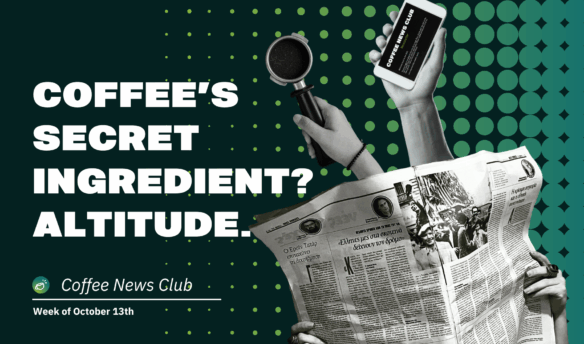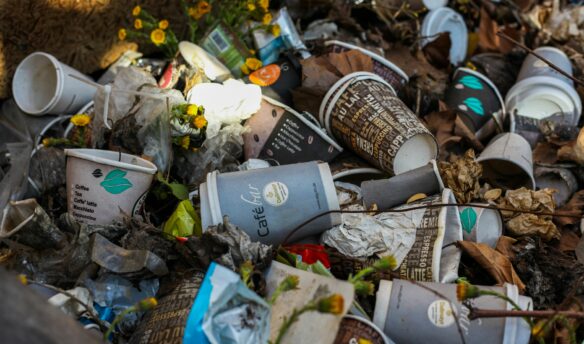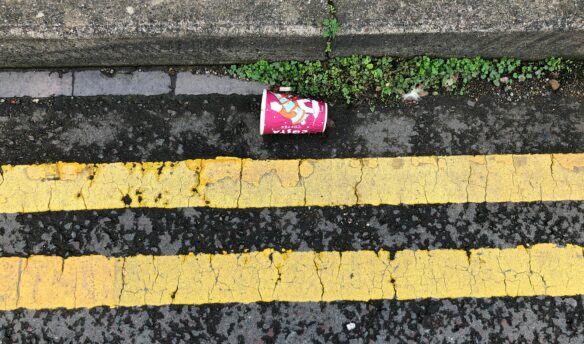A delicious coffee puck? Keurig unveils a new plastic-free K-Cup alternative. Plus, lawmakers and nonprofits are campaigning to ban decaf in California, and coffee might not be causing your migraine.
‘Is California Really Trying To Ban Decaf?’ – via Sprudge
Possibly, eventually, maybe? A California Assembly member has introduced new legislation that would ban coffee decaffeinated using methylene chloride. The bill would take effect in 2027 and require “manufacturers to switch recipes or face a $10,000 fine.”
Methylene chloride is a solvent used in the “European method” of decaffeination. It bonds with—and removes—caffeine molecules from within the coffee bean. The chemical is washed out, and trace amounts should evaporate during storage or roasting. The United States Food and Drug Administration (FDA) has said that the health risks from decaffeinated coffee using methylene chloride are so low “as to be essentially non-existent.” However, methylene chloride is an environmentally harmful chemical, which has led some coffee importers to cease selling coffee decaffeinated using the European method.
The Environmental Protection Agency classifies methylene chloride as “a probable human carcinogen,” although it also notes that “data are inconclusive regarding methylene chloride and cancer.”
The nonprofit Clean Label Project supports California legislation. In 2020, the organization sued five coffee companies for false advertising after they labeled their products as “pure” despite containing trace levels of methylene chloride.
Daily Coffee News notes that “both the new proposed bans would require an extensive series of bureaucratic wins to take effect,” but that doesn’t mean folks aren’t worried. The National Coffee Association (NCA) announced that it would oppose the legislation—they also spoke out against the 2020 lawsuits.
“Banning European Method decaf would defy science and harm Americans’ health,” said NCA President and CEO Bill Murray. “The overwhelming weight of independent scientific evidence shows that drinking European Method decaf is safe and furthermore that drinking European Method decaf, like all coffee, is associated with decreased risk of multiple cancers and other significant health benefits.”
‘Keurig Unveils New Pressed Coffee Rounds to Replace Single-serve Plastic Pods’ – via ABC News
In 2022, a Swiss company launched a new plastic-free coffee pod in the form of seaweed-coated coffee balls. Now, Keurig is introducing a similar new packaging format—called K-Rounds—as an alternative to plastic single-serve pods.
Keurig Dr Pepper announced K-Rounds, a new way to package single-serve coffee that looks literally like a coffee puck, or spent grounds from an espresso portafilter. The pucks are made from “expertly roasted coffee beans that are ground, pressed and wrapped in a proprietary, protective plant-based coating preserving the coffee’s flavor and aroma, eliminating the need for plastic or aluminum.” K-Rounds are part of “a completely reimagined coffee system” for the brand, which includes a new machine “that allows consumers to make a variety of hot and cold barista-style beverages.”
The pucks will be compatible with a new single-serve machine, the Keurig Alta, which will undergo beta testing this year before going on sale. It is part of what Keurig CEO Bob Gamgort calls “our ambitious agenda [which] reflects our commitment to providing variety, quality, value, and sustainability to the 45 million North American coffee consumers who currently use Keurig brewers.”
Coffee pod waste is a big problem: the world produces an estimated 39,000 pods every minute, and 29,000 of those end up in landfills, so moving towards more sustainable options for single-serve coffee is essential. However, you’ll need a whole new machine to try out K-Rounds—they are only compatible with the Alta (although the Alta will remain compatible with traditional K-cup formats).
Currently, 33 million households in the United States have Keurig brewers—guess we’ll have to throw those away and get new machines to use the “sustainable” pucks.
More News
‘Cxffeeblack Announces Participants In Phase Two Of The Barista Exchange Program’ – via Sprudge
‘Probat Extends Reach with Two Equipment Manufacturer Acquisitions‘ – via Daily Coffee News
‘Costa Rica Hosts First Café World Summit‘ – via Global Coffee Report
‘Longstanding UK Roaster Hasbean to Become Ozone Coffee‘ – via Global Coffee Report
‘NKG Pace Announces 2024-25 Class Of Partners’ – via Sprudge
‘US National Coffee Association Announces New Board Leaders’ – via Daily Coffee News
‘Laughing Man Launches National Franchise Program‘ – via Global Coffee Report
‘The 2024 US Coffee Championships Preview‘ – via Sprudge
Is Coffee Good For You?
Coffee and migraines have a complicated relationship. The American Migraine Foundation recommends that frequent headache sufferers abstain from caffeine while acknowledging that some patients have reported that caffeine has a beneficial effect. An article on Harvard’s health blog summarizes the confusion, noting that “the caffeine in coffee, tea, and other foods or drinks can help prevent a headache, treat a headache, and also trigger a headache.”
According to two recent studies, there is no link between coffee consumption and migraines. But the tension remains: in one case, those who consumed more coffee reported lower stress and depression levels.
The first study, undertaken by researchers from Yonsei University College of Medicine in Seoul and published in Scientific Reports, used data from a Korean survey on headaches and sleep and divided participants into three categories depending on their coffee intake. The study found that most headache characteristics and accompanying symptoms didn’t change among the different caffeine consumption categories, but increased coffee intake resulted in decreased levels of depression and stress among participants with migraines.
The second study, carried out by US researchers and published in the journal Headache, found similar results: after tracking the coffee consumption of 98 migraine sufferers for six weeks, they found “no association between habitual caffeinated beverage intake and headache frequency, duration, or intensity.”
The results, the authors write, “suggest that patients with episodic migraine do not have to avoid drinks with caffeine.”
Beyond the Headlines
‘A Brief History Of Coffee As Medicine’ by Jenn Chen
‘The Accidental Coffee Farmer’ by Fionn Pooler
‘How the Palestinian Justice Movement Helped Starbucks Workers United’ by Jonathan Rosenblum
















